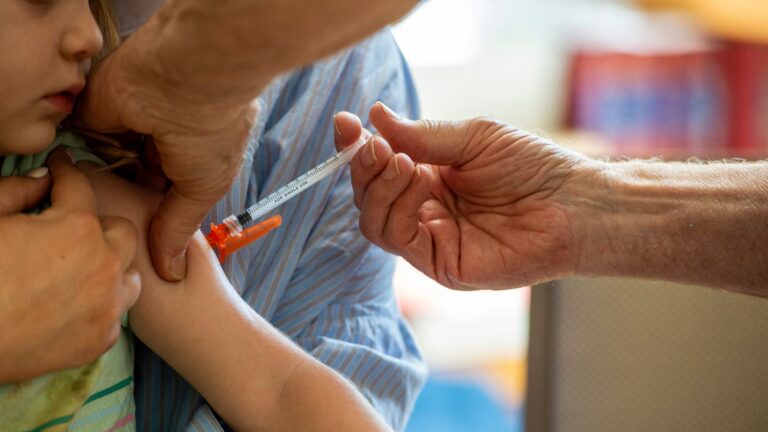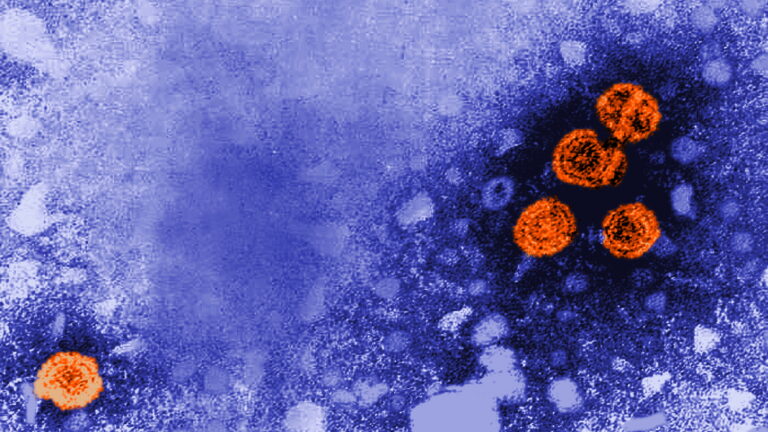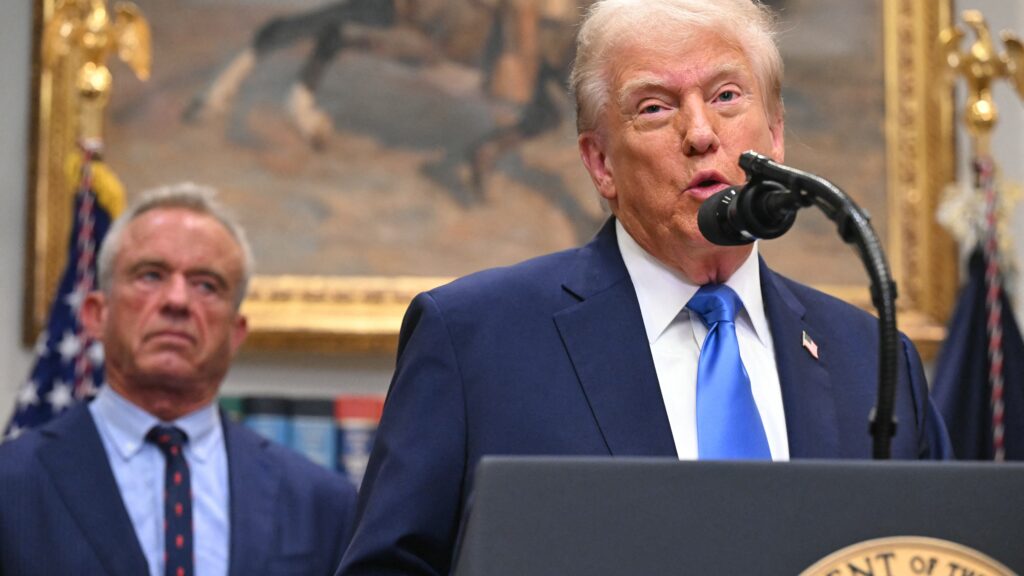WASHINGTON — President Trump on Monday suggested an overhaul to how children get vaccinated after claiming, without evidence, that many vaccines are unsafe as currently given. The president said he has talked with health secretary Robert F. Kennedy Jr. about his proposed changes.
While Trump has occasionally expressed skepticism of some vaccines, the president’s comments were his most extensive and detailed yet about his doubts and plans for action. They came during a White House event on the rise in cases of autism among children, a cause that Trump and Kennedy have zeroed in on.
The extraordinary remarks included Trump suggesting changes to how many shots children get and the time periods over which they get them. The president did not provide any evidence to support changes — instead, he shared personal feelings of revulsion at the number of shots that babies receive, and recounted an anecdote of a child he said was injured by a vaccine.
“Don’t do it,” Trump said, urging parents not to get their children vaccinated on the long-standing, evidence-based schedule. “Get them broken into four or five visits. … It can only help. There’s no downside. It can only be good.”
The doubts the president is fostering about childhood immunizations, as well as potential changes to the schedule, could have monumental consequences for infectious disease control in the United States, public health experts and pediatricians have warned.

Here is how we know that vaccines do not cause autism
As Kennedy, who founded an anti-vaccine nonprofit, has pushed changes to the vaccines that children receive, experts for months have been raising grave concerns that unsubstantiated changes to vaccinations could lead children to suffer unnecessary illnesses and even die.
Trump pitched changes that included spreading vaccine doses over four or five years, splitting the measles, mumps, and rubella vaccine into three separate shots, delaying the hepatitis B vaccine for more than a decade, and removing aluminum and mercury from vaccines. The mercury-based preservative thimerosal has already been removed from vaccines, while aluminum, used in tiny doses to make some shots more powerful, has been shown to be safe.
Taken together, the changes could leave children vulnerable to preventable diseases for a longer period of time, and some are untested or go against decades-old guidance from health experts.
The Centers for Disease Control and Prevention and major medical groups advise health care providers to adhere to the recommended vaccine schedules, carefully created to make vaccines as effective and protective as possible. Trump’s plan of spreading out doses for years could leave children more vulnerable and vaccines less effective.
“The vaccine schedule is like a seatbelt,” Katelyn Jetelina, an epidemiologist and health care communicator, told STAT in a text message after Trump’s announcement. “You don’t wait four years to buckle your child in.”
The president didn’t offer evidence for his ideas beyond revulsion at the current practices.
Autism
More on Trump autism announcement
Trump compared the shots being given to children to large doses of medications given to horses. On the measles, mumps, and rubella vaccine, the president said he had “heard bad things about it for many years,” despite the shot being credited with saving hundreds of thousands of lives.
And he suggested, despite evidence to the contrary, that vaccines are implicated in the rise of reports of autism in the U.S. He said that groups, such as Amish communities, that don’t take vaccines or “any pills” have no autism.
“It’s a disgrace,” Trump said of the current vaccine schedule, with Kennedy and other top health officials alongside him.
The American Psychiatric Association pushed back in a statement after the event: “Vaccines do not cause autism. Claims of any such association have been repeatedly discredited in peer reviewed studies.”
The president said he had started speaking with Kennedy about the issue of vaccines nearly 20 years before. And he said he’d discussed the potential changes he was raising with Kennedy.
Last week, Susan Monarez, the director of the Centers for Disease Control and Prevention whom Kennedy fired, said that Kennedy informed her that he had spoken to Trump about planned changes to the childhood vaccine schedule. Monarez said that Kennedy wanted to make changes that weren’t backed by “data or science.”
During his remarks, Trump insisted that he was a supporter of vaccines.

Kennedy said the federal health agencies he leads are “closely examining” vaccines’ potential role in autism, saying mothers who believe their children were harmed by the shots should be believed.
“We will be uncompromising and relentless in our search for answers,” Kennedy said.
The comments from Trump and Kennedy came during a press conference at the White House about the administration’s efforts to understand the causes of the rise in reported cases of autism. The announcement also included warnings against pregnant women taking Tylenol and its generic versions, as well as a highly unusual approval of a drug to potentially treat autism — both without strong evidence to back them up.
Trump’s comments on vaccines were not reflected in the administration’s “Autism Action Plan.” The plan references vaccines just once, saying that the National Institutes of Health is funding studies on autism that look at a wide array of factors, including medical interventions such as vaccines, as well as nutrition and environmental contaminants.
“I’m making these statements for me,” Trump said, noting that federal health officials may be more careful in their recommendations. “I’m not so careful with what I say.”
Even so, the president suggested the changes he was proposing should be enacted quickly.
Trump also advocated delaying hepatitis B vaccines, which are typically given over the course of children’s first 18 months, until age 12. “I would say, wait until the baby is 12 years old and formed, and take hepatitis B,” he said.
Hepatitis B is highly contagious, and cases in the U.S. have decreased by 99% in children and teens, since the CDC began recommending a birth dose of the vaccine. Infants are highly susceptible to the disease as their immune systems are still developing. Trump suggested most cases of the disease are sexually transmitted, but infants are also susceptible to getting the disease from their mother during childbirth.

Dropping hepatitis B shots for newborns would ignore history and endanger children, scientists warn
Kennedy’s reconstituted vaccine advisory committee considered changing recommendations for the vaccine last week by delaying the first dose that infants now receive at birth until they are at least 1 month old. The panel ended up tabling the vote, because “there’s enough ambiguity here and enough remaining discussion about safety, effectiveness, and timing that I believe that a vote today is premature,” one of the committee members said.
The president also seemed to suggest separating the combined measles, mumps, and rubella vaccine into separate shots. Currently, it is available as a combined shot, sometimes in addition with the chickenpox vaccine.
“The MMR, I think, should be taken separately. This is based on what I feel, the mumps, measles, the three should be taken separately. And it seems to be that when you mix them, there could be a problem. So there’s no downside in taking them separately,” Trump said.
Currently, monovalent vaccines for the three diseases are not available in the U.S., because of widespread adoption of the combined vaccine. Separating out the shots could mean fewer children receive the vaccines if they have to go to the clinic for more visits. It could also mean children spend more time vulnerable to the diseases, as they wait to take the separate shots.
Last week, Kennedy’s vaccine advisory committee voted to recommend children take the varicella (or chickenpox) vaccine separately, rather than receiving the combined MMRV shot, for their first dose of those immunizations. Children who get the MMRV shot as their first dose have a higher risk of febrile seizures, and about 85% of kids currently get separate MMR and varicella shots.
Even as he urged major changes to medical practice, Trump acknowledged the limits of his expertise.
“I’m not a doctor, but I’m giving my opinion,” he said.

